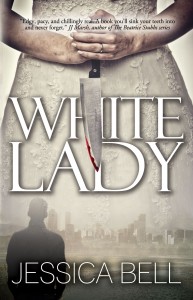 To celebrate the release of her latest novel, WHITE LADY, my writing friend Jessica Bell is giving away an ebook (mobi, ePub, or PDF) to the first person to correctly guess the one in the three statements below. Two statements are false and one is true: To celebrate the release of her latest novel, WHITE LADY, my writing friend Jessica Bell is giving away an ebook (mobi, ePub, or PDF) to the first person to correctly guess the one in the three statements below. Two statements are false and one is true:
Jessica Bell’s first ever job in Australia was as a …
- waitress
- pharmacist’s assistant
- sales assistant in a bead shop
So which one do you think could be true? Write your guess in the comments, along with your email address. Comments will close in 48 hours. If no-one guesses correctly within the 48 hours, comments will stay open until someone does. (We thriller writers are relentless!)
Give it a go – you have a one in three chance!
Want more chances to win? You have until 31 October to visit all the blogs where Jessica will share a different set of true and false statements on each one. Remember, each blog is open to comments for 48 hours only from the time of posting.
If you win, we’ll notify you by email with instructions on how to download the book.
ABOUT THE BOOK:
Jessica’s fluent, realistic style doesn’t hold back, so you should be aware the novel contains coarse language, violence, and sexual themes.
Sonia yearns for sharp objects and blood. But now that she’s rehabilitating herself as a “normal” mother and mathematics teacher, it’s time to stop dreaming about slicing people’s throats.
While being the wife of Melbourne’s leading drug lord and simultaneously dating his best mate is not ideal, she’s determined to make it work.
It does work. Until Mia, her lover’s daughter, starts exchanging saliva with her son, Mick. They plan to commit a crime behind Sonia’s back. It isn’t long before she finds out and gets involved to protect them.
But is protecting the kids really Sonia’s motive?
Watch the book trailer (I recommend it!)
If you can’t wait, here’s where you can buy White Lady.
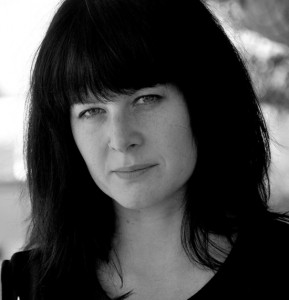 Jessica Bell, a thirty-something Australian-native contemporary fiction author, poet and singer/songwriter/guitarist, is the Publishing Editor of Vine Leaves Literary Journal and the director of the Homeric Writers’ Retreat & Workshop on the Greek island of Ithaca. She makes a living as a writer/editor for English Language Teaching Publishers worldwide, such as Pearson Education, HarperCollins, MacMillan Education, Education First and Cengage Learning. Jessica Bell, a thirty-something Australian-native contemporary fiction author, poet and singer/songwriter/guitarist, is the Publishing Editor of Vine Leaves Literary Journal and the director of the Homeric Writers’ Retreat & Workshop on the Greek island of Ithaca. She makes a living as a writer/editor for English Language Teaching Publishers worldwide, such as Pearson Education, HarperCollins, MacMillan Education, Education First and Cengage Learning.
Connect with Jessica online:
Website | Blog | Vine Leaves Literary Journal | Retreat & workshop
Facebook | Twitter
Alison Morton is the author of Roma Nova thrillers, INCEPTIO, and PERFIDITAS. Third in series, SUCCESSIO, is now out.
Find out about Roma Nova news, writing tips and info by signing up for my free monthly email newsletter.
If you enjoyed this post, do share it with your friends!Like this:Like Loading...
 Today, I’m delighted to welcome acclaimed author and HNS Conference Short Story winner Lorna Fergusson to Roma Nova. Today, I’m delighted to welcome acclaimed author and HNS Conference Short Story winner Lorna Fergusson to Roma Nova.
Born and brought up in Scotland, Lorna studied English at Aberdeen and Oxford Universities. She now runs Fictionfire Literary Consultancy. In addition to her own workshops, she teaches at the Winchester Writers’ Festival and for Oxford University. Her novel The Chase, originally published by Bloomsbury, is now published under her own imprint, Fictionfire Press. Her stories have won an Ian St James Award, been shortlisted for the Bridport Prize and longlisted for the Fish Short Story Prize. Her unpublished children’s novel Hinterland reached the shortlist of four for Pan Macmillan’s Write Now prize. Her story ‘Reputation’, longlisted in the Historical Novel Society’s short story award 2012, appears in the e-anthology The Beggar at the Gate. She is working on a collection of historical short stories and a novel and she has just won the Historical Novel Society’s London 2014 Short Story Award with her story ‘Salt’.
Welcome, Lorna!
Your book The Chase has a beautiful but mysterious cover. Tell us, what attracted you to the idea of setting it in France, and especially in the Dordogne?
 For several years my husband and I had a half-share in a house near Bergerac. We’d always had a lot of love for French culture. I completely fell in love with the Dordogne landscape and the powerful sense of the layers of history all around. The region has strong associations with England – whether back in medieval times or currently, where some villages still have a sizeable English population. For several years my husband and I had a half-share in a house near Bergerac. We’d always had a lot of love for French culture. I completely fell in love with the Dordogne landscape and the powerful sense of the layers of history all around. The region has strong associations with England – whether back in medieval times or currently, where some villages still have a sizeable English population.
In The Chase, the central characters Netty and Gerald Feldwick move to the Dordogne in the 1980s, buying an old hunting lodge in the heart of the woods where they think they can escape memories of a terrible loss. As their intense emotional drama plays out, we learn that the mysterious house is haunted by the spirit of the past. I decided to give special resonance to the location by interpolating short chapters to show the reader what has really been going on in that place.
 These episodes move through pre-history (the novel opens with cave-paintings like those of Lascaux and Font de Gaume), the Gallo-Roman period, the Hundred Years’ War, the French Revolution, the early nineteenth century and the Second World War. I had great fun researching and writing each of these vignettes and using them to heighten the atmosphere and mirror the central story. I also loved capturing the sensory appeal of the countryside, the food, the architecture, the joie de vivre of the Périgord. In everything I write, history and location matter. I’m fascinated by our relationship with the people of the past – in what ways they were like us and in what ways they differed. And I can never read about historical events without thinking ‘That would make a good story’! These episodes move through pre-history (the novel opens with cave-paintings like those of Lascaux and Font de Gaume), the Gallo-Roman period, the Hundred Years’ War, the French Revolution, the early nineteenth century and the Second World War. I had great fun researching and writing each of these vignettes and using them to heighten the atmosphere and mirror the central story. I also loved capturing the sensory appeal of the countryside, the food, the architecture, the joie de vivre of the Périgord. In everything I write, history and location matter. I’m fascinated by our relationship with the people of the past – in what ways they were like us and in what ways they differed. And I can never read about historical events without thinking ‘That would make a good story’!
You run courses for writers through Fictionfire. What do you think is the most important thing new writers need to learn to equip them for a successful career?
Well, there are lots of possible answers to this one, but if you’re planning to make a career out of writing, I think the key attribute you need is resilience. Resilience means being able to come back to the page or screen, day after day, year after year, whether the writing is going well or badly, because you’re committed to pursuing your art to the best of your ability. If you’re resilient you can take criticism on the chin and you can learn from it. You can cope with rejection – and rejection will come, believe me! Resilience gives you the strength to shed tears and shout a bit when you’ve been misunderstood, when the story you loved writing can’t seem to find a home, when the market seems to have closed its doors to you. After the tears and the shouting and the vows you’ll give up on the whole damn thing, what do you do? You keep writing.
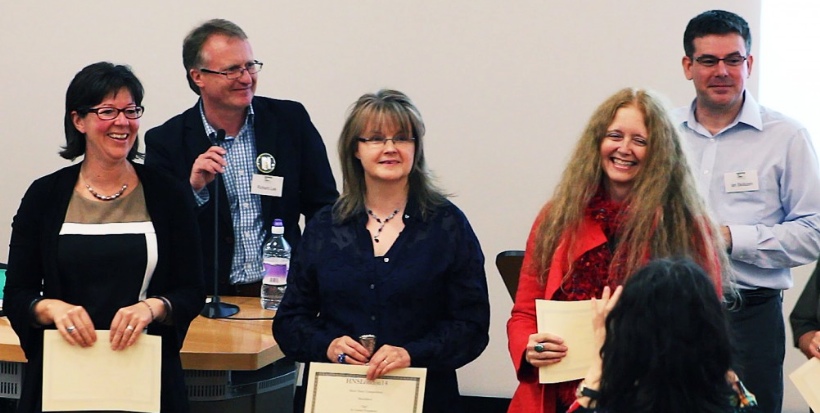 Lorna (centre) winner of the 2014 HNS Conference Short Story Competition (Photo courtesy of Johnny Yates for the HNS) Resilience is adventurousness – you may decide you’ll publish your own work, create your own niche, do your own marketing. You need faith in yourself as a writer. What resilience is not, however, is arrogance: you’re willing to listen to advice and you’re open to change. If you’re resilient, you bend – you don’t break. Your reward may not be the mega book-deal you dreamed of – it may be even better, even more lasting. It may be that someone eagerly tells you they sat up half the night to read your book – what could be more satisfying than to know you affected a reader’s emotions through the power of your words? Essentially, the reward lies in knowing you stuck to the task, you believed you could do it – and you saw it through.
 St Ives And when’s your next course for writers?
‘Fictionfire by the Sea Writers’ Workshop and Retreat’, St Ives, Cornwall 17-19 October: www.fictionfire.co.uk/page28.htm
Some nice things others have said about The Chase…
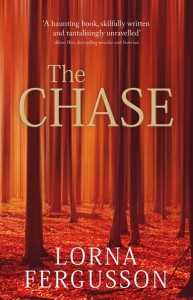 ‘Lorna Fergusson weaves a vivid but dark tale set in the beautiful Dordogne, where past and present fuse in a page-turning mystery. I could go back to this again and again.’ Alison Weir, novelist and historian ‘Lorna Fergusson weaves a vivid but dark tale set in the beautiful Dordogne, where past and present fuse in a page-turning mystery. I could go back to this again and again.’ Alison Weir, novelist and historian
‘Steeped in the atmosphere, history and excitement of France … It is definitely the sort of book that is difficult to put down.’ Living France magazine
Where can we buy your book?
The Chase is available as a paperback (including from the author’s online shop at www.fictionfire.co.uk ) and as an ebook: http://myBook.to/LFergussonTheChase and also on Kobo: http://www.kobobooks.com/search/search.html?q=9780957647404
Thank you for taking time out of your schedule and good luck with your writing and teaching.
Find out more about Lorna:
Lorna’s blog, Literascribe: http://literascribe.blogspot.co.uk
Fictionfire Literary Consultancy: www.fictionfire.co.uk
Facebook: www.facebook.com/LornaFergussonAuthor and www.facebook.com/Fictionfire-Inspiration-for-Writers
Twitter: @LornaFergusson
Updated 2025: Alison Morton is the author of Roma Nova thrillers – INCEPTIO, CARINA (novella), PERFIDITAS, SUCCESSIO, AURELIA, NEXUS (novella), INSURRECTIO and RETALIO, and ROMA NOVA EXTRA, a collection of short stories. Audiobooks are available for four of the series. Double Identity, a contemporary conspiracy, starts a new series of thrillers. JULIA PRIMA, Roma Nova story set in the late 4th century, starts the Foundation stories. The sequel, EXSILIUM, is now out.
Find out more about Roma Nova, its origins, stories and heroines and taste world the latest contemporary thriller Double Identity… Download ‘Welcome to Alison Morton’s Thriller Worlds’, a FREE eBook, as a thank you gift when you sign up to Alison’s monthly email update. As a result, you’ll be among the first to know about news and book progress before everybody else, and take part in giveaways.
If you enjoyed this post, do share it with your friends!Like this:Like Loading...
Try saying that title fast!
Last year I entered a story in the Writing Magazine 2013 New Subscribers’ Short Story Competition. Not being a natural in the short story writing department, I’d given it a go anyway. Writing in a mode that’s difficult for you is excellent practice and really exercises your writing muscles. I didn’t hear anything further, so shrugged my mental shoulders and forgot about it.
When I opened the 2015 competitions supplement enclosed with the recent Writing Magazine, I glanced through it and found the winning story (Sphagnum Moss), then spotted my name in the box with the shortlistees’ names.
Wow!
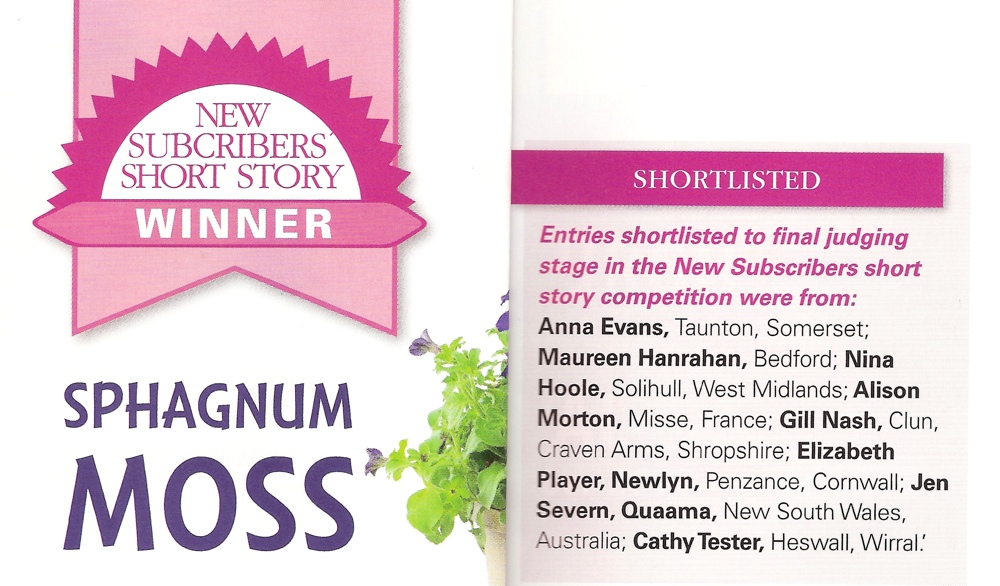
I might try another competition sometime…
Alison Morton is the author of Roma Nova thrillers, INCEPTIO, and PERFIDITAS. Third in series, SUCCESSIO, is now out.
Find out about Roma Nova news, writing tips and info by signing up for my free monthly email newsletter.
If you enjoyed this post, do share it with your friends!Like this:Like Loading...
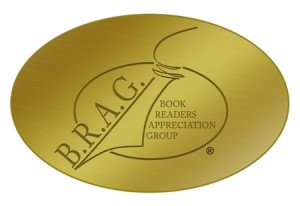 Self-publishing is expanding exponentially; it has long ceased to be a minority interest. But along with the glorious freedom of writing any genre, mixed genres or no genre and the ability to control every aspect of a book’s production comes responsibility to the readers. Self-publishing is expanding exponentially; it has long ceased to be a minority interest. But along with the glorious freedom of writing any genre, mixed genres or no genre and the ability to control every aspect of a book’s production comes responsibility to the readers.
Some authors write books purely for their own pleasure and that’s great fun and personally very satisfying, but today self- or independent publishing is a serious option for career writers. However, not everybody is conscientious in producing a well-rounded, page-turning book with impeccable production values. How is a reader able to distinguish the dross from the diamonds in today’s avalanche of self-published work?
This is where the B.R.A.G. Medallion comes in. Based in the US, but rapidly becoming recognised in the world of self-publishing as a seal of excellence, IndieBRAG’s selection process is rigorous, rejecting 90% of applicants.
 When INCEPTIO, the first of the Roma Nova thrillers, was awarded a Medallion, I was delighted; my writing had passed one of the highest bars around. In February this year I heard that the second book in the Roma Nova series, PERFIDITAS, had also been selected. Silly grins all round and bubbly opened. When INCEPTIO, the first of the Roma Nova thrillers, was awarded a Medallion, I was delighted; my writing had passed one of the highest bars around. In February this year I heard that the second book in the Roma Nova series, PERFIDITAS, had also been selected. Silly grins all round and bubbly opened.
And yesterday, SUCCESSIO leapt the 90% barrier. Extremely silly grins all round and double ration of bubbly.
Around 150,000 (conservative figure) new book titles are published in the UK alone each year, plus goodness knows how many self-published books. Most readers browsing for a book spend about 5 seconds looking at the cover. Having the B.R.A.G. gold medallion on your books grabs a reader’s attention and indicates to them it will be a quality assured read, whatever its genre.
And who am I to disagree? Cheers!
Alison Morton is the author of Roma Nova thrillers, INCEPTIO, and PERFIDITAS. Third in series, SUCCESSIO, is now out.
Find out about Roma Nova news, writing tips and info by signing up for my free monthly email newsletter.
If you enjoyed this post, do share it with your friends!Like this:Like Loading...
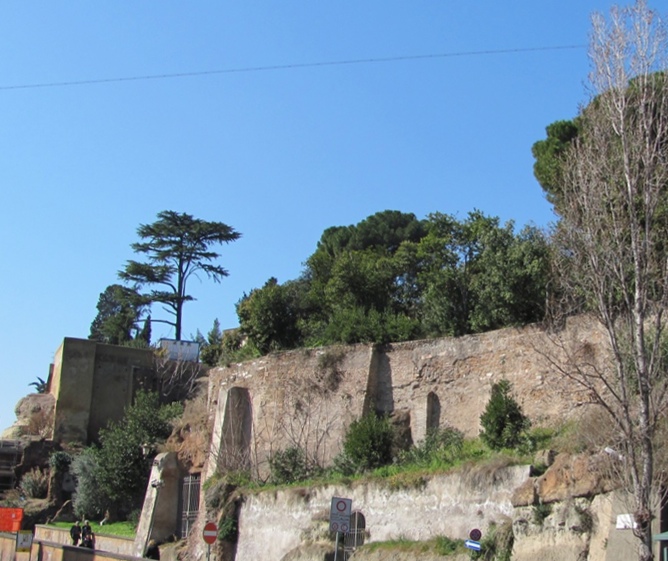 Tarpeian Rock, site of execution of traitors in Ancient Rome Betrayal, treachery, treason, deceit, perfidy – all names for the calculated violation of trust.
Trust is something we build up gradually, firstly, in our parents and carers, then teachers, friends, mentors, colleagues, in lovers and partners, in a organisation, an ideal, a country. We also build trust in ourselves, not just confidence or self-esteem, but the expectation we will do the right thing, whatever that is. Sadly, this trust is often broken. Sometimes, it’s a mis-spoken word, a leaked secret, emotional or physical involvement with another, unjust dismissal, abuse, being led into a harsh place under false pretences or dropped into a pile of trouble and deserted.
The effect of betrayal
We are wounded, cut to the bone, violated, crushed. People describe a shutter falling, a machete swinging through the air, a massive rift opening as in an earthquake. Shock, disbelief, despair, anger and a deep desire for revenge follow. Sometimes, we are engulfed by the feeling that we somehow deserved it and that we are an ‘unworthy’ person. If we get through those emotions, then we withdraw, a little more cynical and bitter at the world.
Personally, I try really hard to pull in the logical part of my mind to analyse the reason for this betrayal. I think that if I can work out why it’s happened I might be able to understand and prevent it happening in other circumstances. But the wound never really heals…
 Philby, Burgess and Maclean (film) We have a huge aversion to being hurt and will strive to avoid it at all costs – this is our animal nature. But it’s also our emotional and intellectual nature. I grew up at the time of the Philby, Burgess and MacLean spy scandals. The last two had defected in 1951, but Philby didn’t flee until 1963 and the media brought up Burgess and Maclean names again. And George Blake, another double agent, escaped from Wormwood Scrubs prison in 1966. All terribly shocking to a young middle class girl brought up on heroic war films (Carve Her Name With Pride, In Which We Serve, Millions Like Us), and in a family which had served their country and had strong principles of justice and doing the right thing.

But we all mature with age and now I take a more nuanced view. Sometimes we are forced to betray, and the strength of character required to resist it belongs to heroines and heroes. I do wonder if we’d all be strong-minded and principled enough to keep faith if we’d lived under Nazi or Stalinist regimes or if somebody was holding a gun at the head of our family?
When I thought about the second Roma Nova book, I knew I wanted to look at the theme of betrayal. In PERFIDITAS, political, professional and personal betrayal are all mixed together – it makes a better story – but the characters feel and express the same devastation.
The tough historical background
 The emperor as pious father of his people (Capitoline Museum, Rome) In ancient Rome, virtue, trust, honour, civic duty were highly valued. The old cliché of falling on your sword if you’d committed a wrong was no cliché; political suicide (whether ‘encouraged’ or genuine) was frequent. Service to the state was considered to be the norm especially in the Republican period.
The mos maiorum (ancestral custom) was the unwritten core code from which the ancient Romans derived their social norms. It included time-honoured principles, behavioural models and social practices for private, political and military life.
• Fides: trust/trustworthiness, faithfulness, reliability, credibility – a significant concept in Roman law, as oral contracts were common.
• Pietas: dutiful respect towards the gods, homeland, parents and family
• Religio and Cultus: religio is the bond between gods and mortals, as carried out in traditional religious practices and cultus was the active observance and correct performance of rituals
• Disciplina: as related to education, training, discipline and self-control
• Gravitas: dignity, responsibility and earnestness
• Constantia: steadiness or perseverance particularly in the face of adversity
• Virtus: derived from the Latin word vir (man), virtus constituted the ideal of the true Roman male – valour, courage, and manliness – particularly in the public sphere
• Dignitas: reputation for worth, honour and esteem earned through displaying the other virtues
• Auctoritas earned prestige, social standing and respect
 Symmachus, pleading for traditional Roman values and religion The Romans developed a strongly centralized sense of identity while adapting to changing circumstances. However, the mos maiorum depended on consensus and moderation among the ruling elite, whose competition for power and status threatened it as did the emergence of democratic plebeian politics.
Following the collapse of the Republic after the death of Julius Caesar, Augustus disguised his radical program under an outward show of respect for the mos maiorum. During the transition to the Christian empire, traditional Romans like Symmachus argued that Rome’s continued prosperity and stability depended on preserving the mos maiorum, while many early Christians dismissed it as “the superstition of old grandpas” (superstitio veterum avorum) and inferior to their new religion.
Roma Novans’ core values are close to the principles of mos maiorum but have evolved over the centuries. Although the political structure has become democratic by the 21st century, the central set of values has persisted. Betrayal or ‘perfiditas‘ is not only abhorrent to them, but it breaks with all their blood and bone instincts. And in the second Roma Nova thriller, it’s all around them…
More about PERFIDITAS
Alison Morton is the author of Roma Nova thrillers, INCEPTIO, and PERFIDITAS. Third in series, SUCCESSIO, is now out.
Find out about Roma Nova news, writing tips and info by signing up for my free monthly email newsletter.
If you enjoyed this post, do share it with your friends!Like this:Like Loading...
|
Subscribe to Blog via Email
Join 50 other subscribers.
Categories
Archive
|
 To celebrate the release of her latest novel, WHITE LADY, my writing friend Jessica Bell is giving away an ebook (mobi, ePub, or PDF) to the first person to correctly guess the one in the three statements below. Two statements are false and one is true:
To celebrate the release of her latest novel, WHITE LADY, my writing friend Jessica Bell is giving away an ebook (mobi, ePub, or PDF) to the first person to correctly guess the one in the three statements below. Two statements are false and one is true: Jessica Bell, a thirty-something Australian-native contemporary fiction author, poet and singer/songwriter/guitarist, is the Publishing Editor of Vine Leaves Literary Journal and the director of the Homeric Writers’ Retreat & Workshop on the Greek island of Ithaca. She makes a living as a writer/editor for English Language Teaching Publishers worldwide, such as Pearson Education, HarperCollins, MacMillan Education, Education First and Cengage Learning.
Jessica Bell, a thirty-something Australian-native contemporary fiction author, poet and singer/songwriter/guitarist, is the Publishing Editor of Vine Leaves Literary Journal and the director of the Homeric Writers’ Retreat & Workshop on the Greek island of Ithaca. She makes a living as a writer/editor for English Language Teaching Publishers worldwide, such as Pearson Education, HarperCollins, MacMillan Education, Education First and Cengage Learning.























